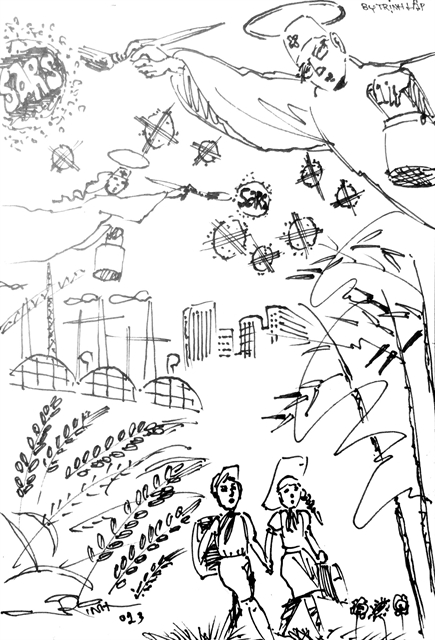 Talk Around Town
Talk Around Town

 |
| Illustration by Trịnh Lập |
by Nguyễn Mỹ Hà
This week, Việt Nam remembers the medical personnel who died 20 years ago trying to stop the deadly SARS disease from spreading further.
The deadly respiratory disease took the life of medical staff at Hà Nội's French Hospital. The first nurse Nguyễn Thị Lượng died on March 15, 2003, followed by French doctor Jean-Paul Dirosier a few days later. Two Vietnamese, doctor Nguyễn Thế Phương and nurse Phạm thị Uyên both died on March 24, followed by Dr Carlo Urbani, a WHO Việt Nam specialist who died in Thailand.
Dr Nguyễn Hữu Bội died in April in Hà Nội, and Dr Jacques-Yves Ketelers lost his life to SARS three months later on July 8 in France.
As a result of their work, Việt Nam was spared from a medical catastrophe that spread to 30 countries and claimed more than 800 lives.
Every life is precious, and the medical staff who risked their lives to identify the disease and were exposed to the virus when taking care of the first patients should be commemorated as heroes.
This week, a museum dedicated to Carlo Urbani, the Italian MD who served as World Health Organisation Chief Representative in Việt Nam and helped identify the virus, was unveiled in his home country of Italy.
Having had prior job assignments with Doctors without Borders in Cambodia, Urbani and his family arrived in Hà Nội in May 2000, taking up the position as WHO's specialist in charge of malaria and other parasitic diseases.
After being consulted at Hanoi French Hospital on the case of a Chinese-American businessman, suspected of having bird flu, Urbani died from sudden acute respiratory syndrome just weeks after he had helped identify it and alerted the world to its dangers.
Urbani, who was a public health specialist in charge of malaria and other parasitic diseases, first came across the syndrome when he administered the foreign Chinese-American businessman who had arrived in the capital on February 23, and was admitted to the French Hospital three days later.
When the businessman's condition worsened, the hospital called Urbani to examine him. Two days later, not only had the man's condition worsened, but several members of the hospital staff had developed similar symptoms: a dry cough, difficulty breathing, and a fever.
Urbani issued prompt medical orders to isolate staff with symptoms and strengthened control practices. Though the disease could have been generated from Hong Kong, where the first case in Việt Nam came from, Urbani alerted WHO head office in Geneva, and with support of the regional office in Hà Nội let the world know that something grave was happening.
In less than a week, the WHO team in Hà Nội won the support of government authorities to bring in international assistance and called for international experts, who came over from the Philippines a couple of days later.
Urbani convinced health authorities of Việt Nam to keep a close health watch on tourists to the country, which slowed the spread of cases.
World leading epidemiologists kept coming to Hà Nội to help contain and study the outbreak in mid-March when WHO declared the syndrome a "worldwide health threat." According to WHO, it had "never reacted with such speed to an outbreak, and in part this was thanks to Urbani and his colleagues in Hà Nội."
Having been in close contact with patients for two weeks, Urbani felt unwell on a trip to Bangkok and went straight to the hospital. He was reportedly asked to donate his lungs for future research on the disease.
He soon died of SARS, the disease he helped identify.
Thanks to Urbani, Việt Nam became the first country to announce it had stopped the SARS outbreak and in May 2003, Việt Nam's Ministry of Health posthumously awarded him the honourable Friendship Order and Medal for People's Health.
His legacy in Việt Nam does not stop there: a project to build the Carlo Urbani Medical Centre, based at the School of Medicine in Huế, started in 2007 with financial assistance from the Italian Association of Higher Education Organisations Institutions. This will be Việt Nam's second-largest centre for parasite studies, training and scientific research on respiratory infections.
Throughout history, people in Việt Nam have sacrificed their lives to save others. Many are seen as saints and even worshipped in temples throughout the country. Urbani may not have followed Vietnamese beliefs, but his dedication to the health of the people inspired others, and gave way to further research.
We will not forget the names of all the other medical staff who also died trying to contain and stop the spread of this fatal disease; further recognition for their contribution awaits decisions from the government and health authorities. VNS